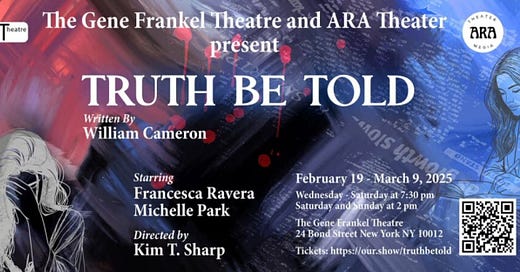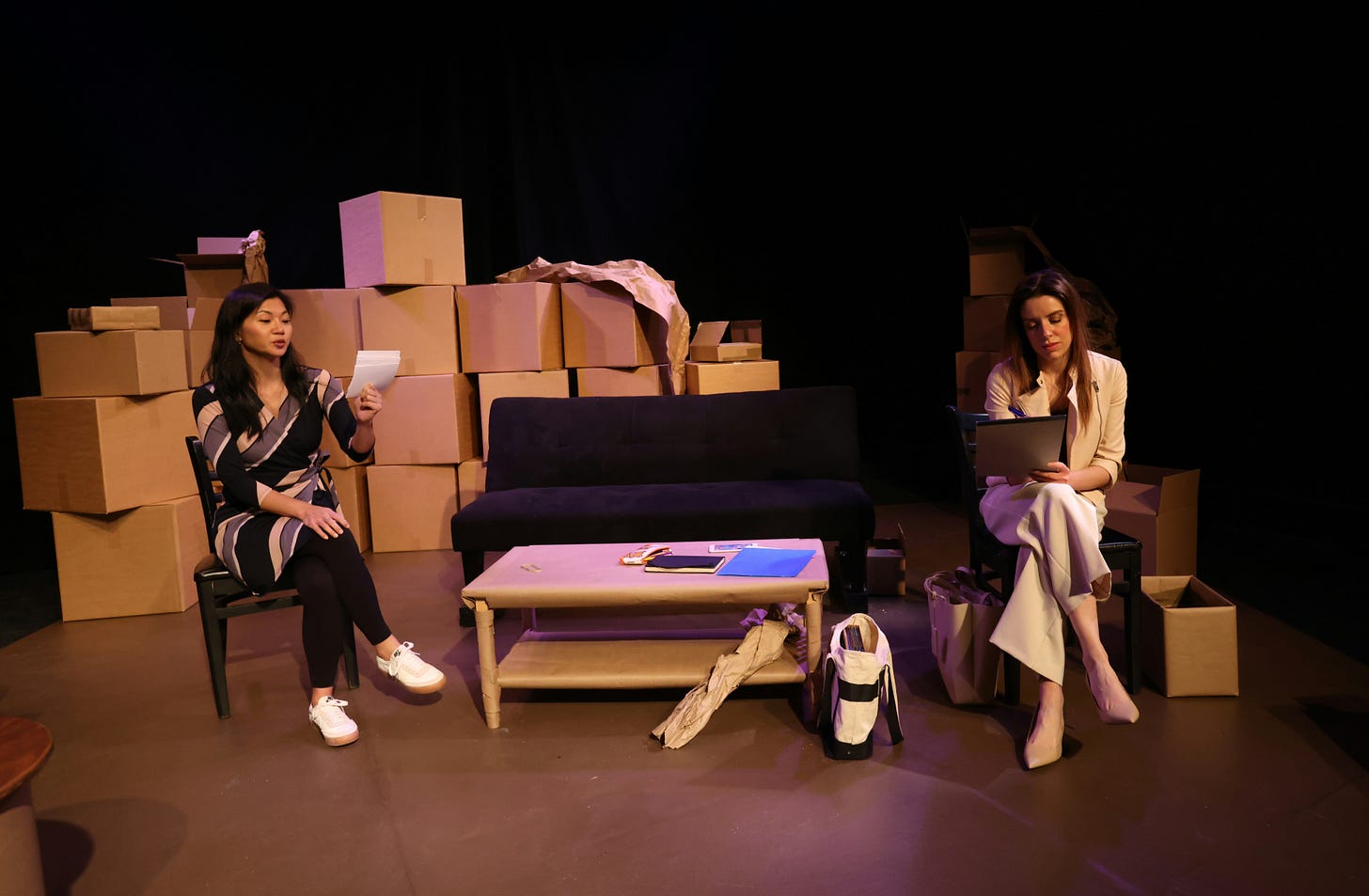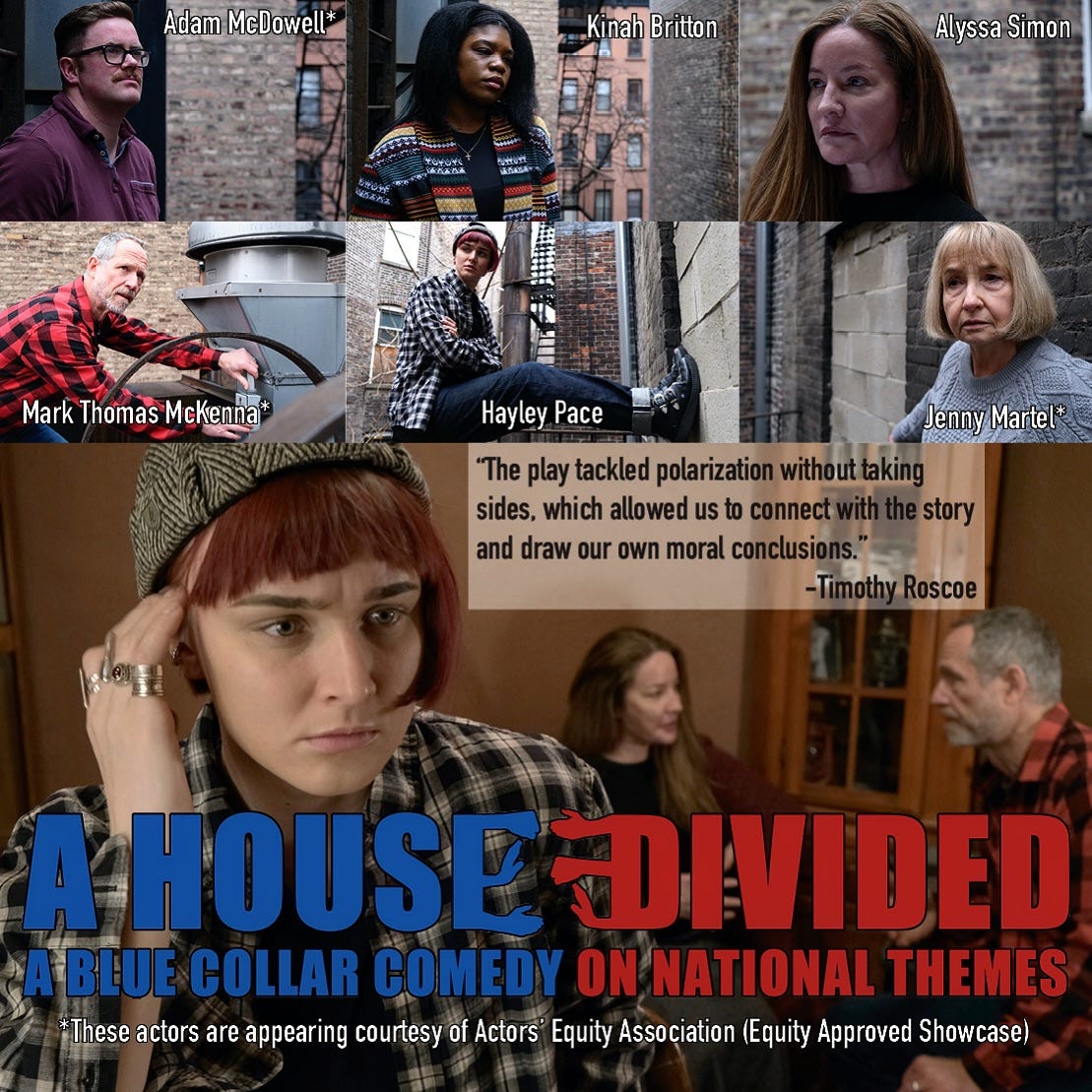March turned out to be a month of theatrical extremes for me. Within the space of a couple of weeks, I saw two very different plays — one that left me emotionally wrung out in the best possible way, and one that left me staring at the stage in utter bewilderment, wondering….what the hell?
The Triumph: Truth Be Told by William Cameron
Directed with quiet precision by Kim T. Sharp, Truth Be Told is one of those plays that stays with you long after the curtain comes down. It’s an intimate, deeply emotional two-hander about grief, trauma, and the slipperiness of truth in an age where facts are constantly under siege.
Francesca Ravera and Michelle Park absolutely own this story. Park plays Kathleen Abedon, the mother of a young man accused of committing a horrific mass shooting — a tragedy that also claimed the life of her husband. One year later, she sits down with Ravera’s Jo Hunter, a true-crime writer intent on uncovering the “real story.” What follows is a riveting and emotionally charged battle of wills and grief, as Kathleen tries to convince Jo — and us — that her son was framed.
Park is utterly convincing as a mother navigating unimaginable pain, heartbreak, and stubborn hope. Every word, every hesitation, every flicker of emotion felt painfully real. Ravera, for her part, is an absolute powerhouse on stage — sharp, probing, layered. The dynamic between them crackled with intensity, making for an unforgettable theatrical experience.
What impressed me most was how carefully and sensitively the play handled its subject matter. Cameron’s writing doesn’t sensationalize or oversimplify; instead, it grapples with the complexity of truth and trauma in a way that felt honest and human. Sharp’s direction trusted the material — and his actors — allowing the story to breathe and the emotions to land without ever feeling forced.
Both Park and Ravera should be immensely proud of their performances. Truth Be Told is exactly the kind of theatre that reminds you why live storytelling matters.
The Trainwreck: A House Divided by Joshua Crone
And then there was A House Divided.
Where Truth Be Told was nuanced and compassionate, A House Divided felt like a blunt instrument to the head — except instead of knocking any sense into its audience, it mostly inspired head-scratching and the occasional eye-roll.
The premise isn’t inherently bad: a family torn apart by the 2016 election reunites for Thanksgiving years later, still nursing old wounds and navigating new ones in a post-pandemic, politically charged America. Unfortunately, Crone’s execution leaves a lot to be desired.
Every single character felt like a walking, talking stereotype. The conservative dad who listens to talk radio. The liberal mother who is desperate to be seen an ally. The bitter, racist grandmother. It was like someone fed Twitter memes into a script generator and called it a day.
And then there was the musical number. Yes, really. Out of nowhere, the cast broke into a bizarre song-and-dance routine that felt so wildly out of place I genuinely wondered if I had hallucinated it.
But what really left a sour taste in my mouth was the ending. After all the arguing, the political jabs, and the manufactured drama, the family just… watches a movie together. Problem solved. As if the deep fractures in American society can be healed by simply deciding not to talk about politics anymore. The message — intentional or not — seemed to boil down to: “Can’t we all just get along?”
In 2025, that’s not just naive — it’s borderline irresponsible. Silence isn’t neutrality. It’s complicity.
To their credit, the cast was doing their absolute best with what they were given. There’s no doubt these were talented actors — they deserved a far better script.
Final Thoughts
It’s always interesting seeing two plays in close succession that are tackling weighty, timely themes. One (Truth Be Told) trusted its audience to sit in discomfort, to wrestle with ambiguity, and to feel deeply. The other (A House Divided) seemed desperate to tie everything up in a neat little bow, ignoring the messy reality of the world we live in.
Guess which one I’ll be thinking about for a long time — and which one I’d rather forget?





